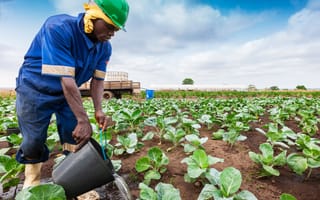
Although we still discuss climate change as an abstract future problem, it is a major threat to the livelihoods of farmers in the developing world.
In recent years, African countries like Ghana, Kenya and Uganda have faced some of the worst droughts in the history of the continent. Ghana loses a reported $200 million in crops each year, while Kenyans are becoming food insecure by the millions.
WorldCover, a NYC-based startup, is working to provide drought insurance to farmers, and creating an economic system where a poor crop yield one year won’t ruin a farmer’s future prospects.
Today, WorldCover announced it has secured $6 million in Series A funding to take its mission further. MS&AD Ventures led the funding, with participation also coming from Y Combinator, Western Technology Investment and EchoVC Partners.
Founded in 2015, WorldCover uses a combination of satellite imagery and on-the-ground sensors to understand local weather patterns and create insurance options for farmers facing some of the worst droughts on the planet.
Presently, WorldCover works with approximately 30,000 farmers in Ghana, Kenya and Uganda, where maize, rice and peanuts are the primary yields.
The company plans to use its latest round of funding to expand both its geographical reach, as well as its coverage options. India, Mexico, Brazil and Indonesia are all on the company’s docket. WorldCover also hopes to start offering options for farmers growing coffee, cocoa and cashews.
Although farming has long been difficult in the regions WorldCover insures, severe weather events are getting more frequent. In an interview with TechCrunch, CEO and co-founder Christopher Sheehan said climate change is exacerbating the issues facing farmers and their families.
While crop insurance won’t stop severe weather from threatening food security in developing nations, or address climate change writ large, it will help farmers continue to put food on the table and send their children to school. And that should count for something.



